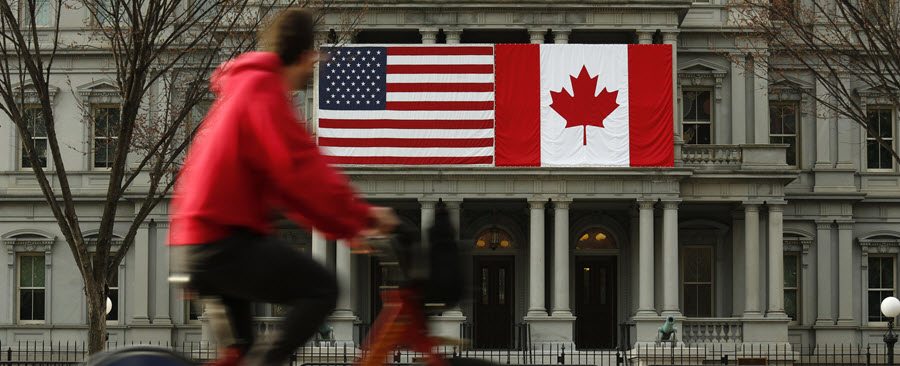NAFTA: A Look at 2 Scenarios for Canada
Written by Judy McKinnon
Published on September 29, 2017
minute read
Share:
The North American Free Trade Agreement (NAFTA) is facing an overhaul as Canada, the United States and Mexico renegotiate the comprehensive trade deal that's been in place since 1994. The third round of talks recently wrapped in Ottawa and negotiators are reportedly aiming to reach a deal by the end of the year.
So, just what's at stake for Canada as the negotiations play out? RBC Economist-Policy Lead Mathias Hartpence, in a report titled NAFTA: Renewal or Rejection? What Canada is up against, laid out a best case vs. worst case scenario just as renegotiations kicked off late this summer.
Overall, he doesn't think it'll be a "one-sided boxing match." There will be "jabs on offensive priorities, parrying on mutual sensitivities—and handshakes on areas of shared interest."
As for the two scenarios, here's some of what he had to say:
Best Case
"A best-case outcome for Canada would play up those shared interests: for the U.S. and Canada, preserving reciprocal market access for goods across heavily integrated industries; reducing "red tape" at the border; expanding services and government procurement access; and bringing digital trade, labour and the environment into the core of the agreement."
Specifically, he notes that the U.S.'s overall goal is to "improve the U.S. trade balance and reduce the trade deficit with the NAFTA countries." On this front, he thinks Canada is in a good position, pointing out that imports and exports between the two countries are close to balance.
Canadian sectors hit in the past by non-tariff barriers (or restrictions not involving a tax or duty), such as those affected by the U.S. Country of Origin Labeling (COOL) law, could benefit from an easing of those barriers, he said. "Ensured access could allow exporters to specialize further, reap advantages from economies of scale and potentially improve their productivity," he noted.
On rules of origin (ROO), which determine whether goods qualify for NAFTA's duty-free trade, Mr. Hartpence said, "Given the U.S. intends to make ROOs more restrictive, a best case scenario for Canada would be a minor increase."
Worst Case
"A worst-case, however unlikely, would see a U.S. withdrawal from NAFTA, which would have a long-run negative impact on the Canadian economy and could chip a percentage point off (gross domestic product) over the next five to 10 years as tariffs rise. And a bad new deal would raise rules of origin thresholds for "local" content to a level that diminishes Canadian producers' global competitiveness; impose (intellectual property) rules that stymie rather than support innovation; and possibly remove the impartial trade arbitration afforded by NAFTA's Chapter 19."
Among its objectives for NAFTA renegotiation, the U.S. has stated it wants to eliminate the Chapter 19 dispute-settlement mechanism. That's the part of the agreement that allows each of the three countries to refer anti-dumping or countervailing duty challenges to a binding panel for resolution.
"Doing away with Chapter 19 could expose Canadian exporters to fighting trade disputes in U.S. courts, notwithstanding (World Trade Organization) disciplines that would provide some mitigation," Mr. Hartpence wrote.
Round four of NAFTA talks are scheduled to be held in Washington, D.C. in October.
RBC Direct Investing Inc. and Royal Bank of Canada are separate corporate entities which are affiliated. RBC Direct Investing Inc. is a wholly owned subsidiary of Royal Bank of Canada and is a Member of the Canadian Investment Regulatory Organization and the Canadian Investor Protection Fund. Royal Bank of Canada and certain of its issuers are related to RBC Direct Investing Inc. RBC Direct Investing Inc. does not provide investment advice or recommendations regarding the purchase or sale of any securities. Investors are responsible for their own investment decisions. RBC Direct Investing is a business name used by RBC Direct Investing Inc. ® / ™ Trademark(s) of Royal Bank of Canada. RBC and Royal Bank are registered trademarks of Royal Bank of Canada. Used under licence.
© Royal Bank of Canada 2025.
Any information, opinions or views provided in this document, including hyperlinks to the RBC Direct Investing Inc. website or the websites of its affiliates or third parties, are for your general information only, and are not intended to provide legal, investment, financial, accounting, tax or other professional advice. While information presented is believed to be factual and current, its accuracy is not guaranteed and it should not be regarded as a complete analysis of the subjects discussed. All expressions of opinion reflect the judgment of the author(s) as of the date of publication and are subject to change. No endorsement of any third parties or their advice, opinions, information, products or services is expressly given or implied by RBC Direct Investing Inc. or its affiliates. You should consult with your advisor before taking any action based upon the information contained in this document.
Furthermore, the products, services and securities referred to in this publication are only available in Canada and other jurisdictions where they may be legally offered for sale. Information available on the RBC Direct Investing website is intended for access by residents of Canada only, and should not be accessed from any jurisdiction outside Canada.
Explore More

7 Ways to Get Ahead Financially in 2026
How you might invigorate your finances and put your money to work more intentionally this year
minute read

Economic Outlook: Uncertainty is Here to Stay, So What's Next?
Takeaways from the Economic Club of Canada’s Annual Event
minute read

3 things: Week of December 15
What the Inspired Investor team is watching this week
minute read
Inspired Investor brings you personal stories, timely information and expert insights to empower your investment decisions. Visit About Us to find out more.







